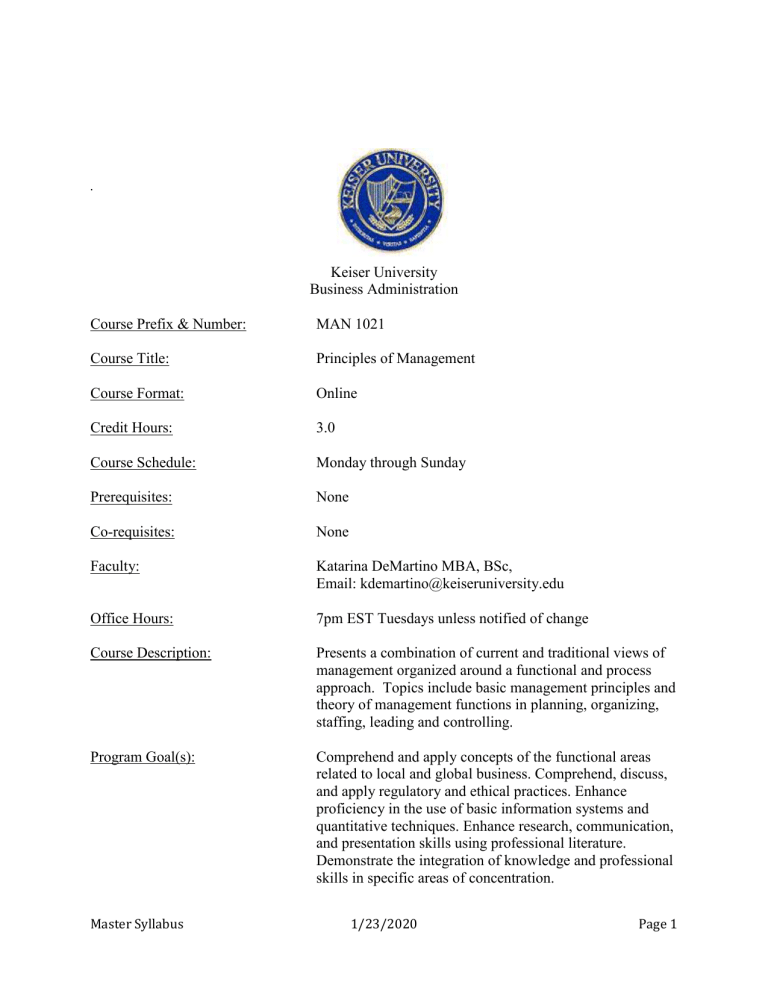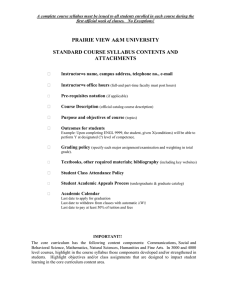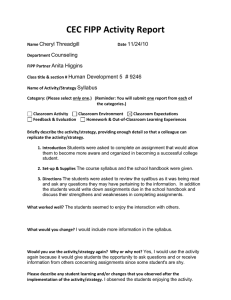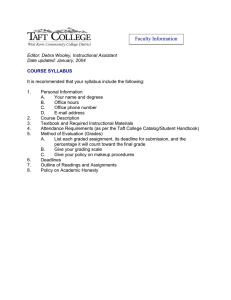Principles of Management Course Syllabus - Keiser University
advertisement

. Keiser University Business Administration Course Prefix & Number: MAN 1021 Course Title: Principles of Management Course Format: Online Credit Hours: 3.0 Course Schedule: Monday through Sunday Prerequisites: None Co-requisites: None Faculty: Katarina DeMartino MBA, BSc, Email: kdemartino@keiseruniversity.edu Office Hours: 7pm EST Tuesdays unless notified of change Course Description: Presents a combination of current and traditional views of management organized around a functional and process approach. Topics include basic management principles and theory of management functions in planning, organizing, staffing, leading and controlling. Program Goal(s): Comprehend and apply concepts of the functional areas related to local and global business. Comprehend, discuss, and apply regulatory and ethical practices. Enhance proficiency in the use of basic information systems and quantitative techniques. Enhance research, communication, and presentation skills using professional literature. Demonstrate the integration of knowledge and professional skills in specific areas of concentration. Master Syllabus 1/23/2020 Page 1 Course Objectives: Upon Completion of the course, the student will be able to: 1. Describe how modern management theory has evolved and how it is applied in today’s work environment. 2. Discuss the principles of ethical and professional business conduct. 3. Explain concepts relating to management of workforce in a diverse business environment. 4. Describe the decision-making process and how managers use this process for planning. 5. Delineate characteristics of organizational structure and control. 6. Apply human resource management including employee motivation techniques. 7. Describe various leadership styles. Grading and Evaluation Methods: Item Discussion/ participation Mid-term examination Case Study 1 Case Study 2 Final examination Final Paper Post Test TOTAL Percent Total Grade 20 15 10 10 20 20 5 100 Due Date Week 1, 2, 3, 4 Week 2 Week 1 Week 3 Week 4 Week 4 Week 4 Grading Scale Letter Grade A B C D F Numeric Grade 90.00-100.00% 80.00-89.99% 70.00-79.99% 65.00-69.99% Up to 64.99% Required Textbook: Jones, G.R. & George, J.M. (2020). Contemporary Management (11h ed). New York, NY: McGraw-Hill. ISBN: 9781260488661 Topical Outline/Course Assignments/Calendar: Master Syllabus 1/23/2020 Page 2 Course Assignment Format is to provide evidence of mastery of the course objectives which are linked to specific program goals and outcomes. Please see attached for an example of this format. (See Attached) Course Guidelines and Policies* *Faculty course guidelines must not contradict standard University or Program policies as stated in the University Catalog, Program Student Handbook and/or Program Manual. Additional guidelines and pre-approved policies may be included, examples appear below. The University Department Chair (UDC) should be consulted prior to making changes in the verbiage or adding additional policies. Any policies included in the syllabus should fit with the “students first” philosophy, and compliment the mission of the University and the program. Academic Integrity Students are expected to maintain the highest standards of academic conduct, professional honesty, and personal integrity. Plagiarism, cheating and other misconduct are serious violations and will not be tolerated, and may result in academic penalties, including suspension or dismissal. Participation Participation is a basic requirement for an effective learning community. Students’ participation will be assessed and reflected in the participation grade. Class participation is based on the following criteria: arriving to class on-time; paying attention during lectures and discussions; respectful listening when someone else is speaking; being engaged in the class and in your learning without distractions such as texting, side-bar conversations, checking your phone or email etc. Missed Tests/Quizzes Makeup exams will be allowed only with pre-approval of the instructor or with an acceptable, documented reason. Acceptable reasons for makeup exams include severe illness, family emergency or other unavoidable events. Exam format for makeup exams may be different than the original exam but the content for the exam will not change. Late Assignments Assignments are due at the start of class on the day noted. Late assignments without penalty will be accepted only in cases of emergency. Students should discuss turning in late work directly with the instructor and in advance of the due date whenever possible. Late assignments will not be accepted if the assignment has already been graded and returned to the class. Civility/Professionalism This class is a community of learners, which means we will depend upon each other for support and information. In order to learn, we must be open to the views of people different than ourselves. Please honor the uniqueness of your classmates and appreciate the opportunity we Master Syllabus 1/23/2020 Page 3 have to learn from one another. Please respect each other’s’ opinions and refrain from personal attacks or demeaning comments of any kind. It is of the utmost importance to communicate with courtesy and professionalism. Professional courtesy includes respecting other’s opinions, being courteous and respectful, and working together in the spirit of cooperation. University and Program Policies Students are expected to abide by the policies set forth in the University Catalog and the Student Program Handbook/Manual. The University Catalog is available electronically at http://www.keiseruniversity.edu/catalog/. The Program Student Handbook/Manual is available electronically at the direction of your instructor. Disability Accommodations: In compliance with the Americans with Disabilities Act (ADA), students who require reasonable accommodations due to a disability to properly execute coursework must complete the application process and receive approval from the review committee. The first step is to consult with the Campus President or Dean of Academic Affairs. Master Syllabus 1/23/2020 Page 4




